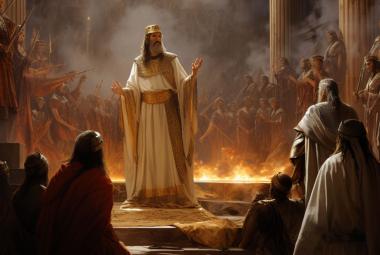As we watch the world descend further and further into darkness, and as the Christian community wonders when God is going to judge America, we would do well to study the dynamics of how God treats His own people during His ordered times of judgment.
Earlier this year Dr. Missler and I were talking about the upcoming Strategic Perspectives Conference VIII, which has been scheduled for 25–26 October 2013 at the Coeur d’Alene Resort. I mentioned that I had recently been reading what God had to say to Jeremiah the prophet’s personal assistant, whose name was Baruch. (No relation to the guy from Kenya who has been occupying the White House since January 20, 2009.) Here’s what Baruch had been saying:
How terrible for me, for the LORD has added sorrow to my pain. I’m weary with my groaning, and I haven’t found rest.
— Jeremiah 45:3 (ISV)
Sounds like a Tea Party blogger writing an op-ed piece for our friend Joseph Farah’s World Net Daily about that other guy whose name sounds like “Baruch,” doesn’t it…?
Baruch was telling God what he felt about all of the evil that had befallen national Israel in the years just before the fall of Jerusalem to Nebuchadnezzar. Frankly speaking, Baruch was worried about himself. He was saying the equivalent of “If God judges—no, make that when God judges Israel, what’s going to happen to me?”
But God was listening to Baruch that day. So He gave this personal message for Jeremiah to give to Baruch, just for Baruch’s edification:
Say this to him: “This is what the LORD says: ‘Look! What I’ve built I’m about to tear down, and what I’ve planted I’m about to pull up—and this will involve the entire land.’ Are you seeking great things for yourself? Don’t seek them. Indeed, I’m about to bring disaster on all flesh,” declares the LORD, “but your life will be spared wherever you go.”
— Jeremiah 45:4 (ISV)
God’s message to Baruch was to stop looking to what might happen to him. God gave him His personal assurance that his life would be spared no matter what else happened, and no matter where he traveled.
But more importantly, God reminded Baruch that he needed to look past his own smaller world of self-interest and look at God’s larger plans for the world. About fifteen centuries’ worth of Divine work was about to be uprooted due to the sin of a bunch of unbelieving, God-hating people who were in control of Baruch’s country and Baruch’s culture.
Does Baruch’s complaint remind you of you?
As we watch the world descend further and further into darkness, and as the Christian community wonders when God is going to judge America, we would do well to study the dynamics of how God treats His own people during His ordered times of judgment. After all, the Bible is clear that when God begins His times of judgment, He begins by disciplining the Church of God.
So it makes sense that Koinonia Institute’s 2013 Strategic Perspectives Conference takes a moment to examine the subject of How God Disciplines His Own. In our opening session on Saturday morning, we’ll take a verse-by-verse look at the second chapter of Hosea’s remarkable book of prophecy, intending that the truths contained in that chapter set the tone for the rest of the day’s presentations.
We’ll study how God realistically addresses unrepentant sin by affirming His relationship with His people, by confronting the situation frankly, and by focusing on root concerns, not merely outward problems.
And we’ll examine the consequences that will come if change doesn’t follow: the certainty of public humiliation, the consequence of spiritual impoverishment, disillusionment that comes to hopes and dreams, and the possibility of a forfeited future.
We’ll also look at how God places a hedge of thorns around the life of the disobedient, causing confusion in life, loss of friends, bringing opportunities to reevaluate former circumstances, withdrawal of God’s protection in the event of continued rebellion, public revelation of sin, removal of joy, economic devastation, and God’s correction being converted to outright punishment.
Along the way, we’ll look at how to minister to the disciplined by being approachable and inviting, by being prepared to set aside time especially devoted to ministry, by speaking encouragement in love, and by seeking creative ways to transform trouble into triumph. And we’ll talk about how we can encourage the hurting by showing what can come from a right response to God’s discipline on a national and personal scale.
We’ll talk about how God can restore joy, how fellowship can be regained, how profane behaviors and relationships can be removed, how destructive consequences can be repaired, how participation in God’s covenant can be renewed, and how knowledge of God can be recovered.
And then we’ll wrap things up by studying how the Lord of Shipwrecked Dreams can equip us to respond with renewed favor before God and man, how God promises to demonstrate in a personal way what a new future can hold, and how worship of Him will be the natural result of having learned to respond rightly to God’s disciplinary work in the hearts of His people.
All of these riches can be discovered in the second chapter of Hosea’s prophecy to disobedient believers, which he recorded just before the judgment of God fell.
Unfortunately for ancient Israel, they never obeyed the principles set forth in Hosea Chapter 2. Maybe Christians in America will be different in the 21st century….
As you make your plans to travel to Coeur d’Alene for the Koinonia Institute’s eighth annual Strategic Perspectives Conference, we’ll all be praying that you come prepared to make a difference in the lives of those who are hurting—or about to be hurting—under the loving but disciplinary hand of God.
We invite you to come with expectation of a potentially good future, not the dread of irrecoverable despondence as we look at what might soon be coming on the earth.






